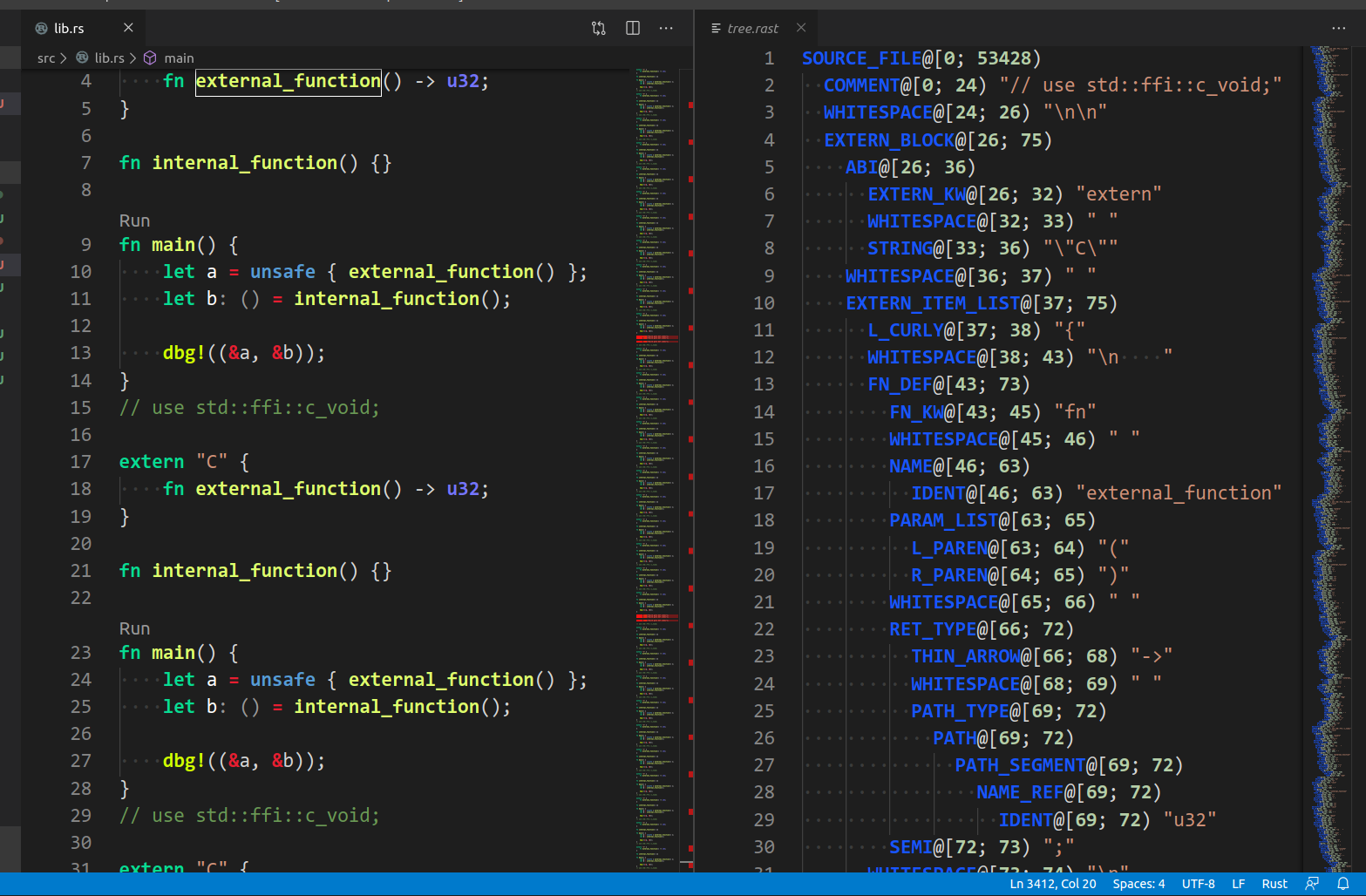This is a quick way to implement unresolved reference diagnostics.
For example, adding to VS Code config
"editor.tokenColorCustomizationsExperimental": {
"unresolvedReference": "#FF0000"
},
will highlight all unresolved refs in red.
This is covered under vscode's "editor.semanticHighlighting.enabled"
setting plus the user has to have a theme that has opted into highlighting.
Bumps required vscode stable to 1.44
In textmate, keyword.control is used for all kinds of things; in fact,
the default scope mapping for keyword is keyword.control!
So let's add a less ambiguous controlFlow modifier
See Microsoft/vscode#94367
After refactoring the config we forgot to set defaults for
some properties like workspaceLoaded, callInfo.full, etc.
This commit restored them to being turned on by defult,
as well added defaults for other props to be more explicit
on their defualt value.
3817: vscode: highlight syntax tree ro editor r=matklad a=Veetaha
Small textmate grammar declaration to make rust-analyzer syntax tree more easily inspectable:
Btw, if we change the file extension of our `ra_syntax/test_data/**` files to `.rast` they should be highlighted in vscode too.
The colors of the tokens are actually going to be color-theme dependent, or you can customize them via:
```jsonc
{
"editor.tokenColorCustomizations": {
"textMateRules": [ { "scope": "name", "settings": { /* */ } } ]
}
}
```

Related: #3682
Co-authored-by: veetaha <veetaha2@gmail.com>
3629: Alternative aproach to plugin auto update r=matklad a=matklad
This is very much WIP (as in, I haven't run this once), but I like the result so far.
cc @Veetaha
The primary focus here on simplification:
* local simplification of data structures and control-flow: using union of strings instead of an enum, using unwrapped GitHub API responses
* global simplification of control flow: all logic is now in `main.ts`, implemented as linear functions without abstractions. This is stateful side-effective code, so arguments from [Carmack](http://number-none.com/blow/john_carmack_on_inlined_code.html) very much apply. We need all user interractions, all mutations, and all network requests to happen in a single file.
* as a side-effect of condensing everything to functions, we can get rid of various enums. The enums were basically a reified control flow:
```
enum E { A, B }
fn foo() -> E {
if cond { E::A } else { E::B }
}
fn bar(e: E) {
match e {
E::A => do_a(),
E::B => do_b(),
}
}
==>>
fn all() {
if cond { do_a() } else { do_b() }
}
```
* simplification of model: we don't need to reinstall on settings update, we can just ask the user to reload, we don't need to handle nightly=>stable fallback, we can ask the user to reinstall extension, (todo) we don't need to parse out the date from the version, we can use build id for nightly and for stable we can write the info directly into package.json.
Co-authored-by: Aleksey Kladov <aleksey.kladov@gmail.com>
Everything now happens in main.ts, in the bootstrap family of
functions. The current flow is:
* check everything only on extension installation.
* if the user is on nightly channel, try to download the nightly
extension and reload.
* when we install nightly extension, we persist its release id, so
that we can check if the current release is different.
* if server binary was not downloaded by the current version of the
extension, redownload it (we persist the version of ext that
downloaded the server).